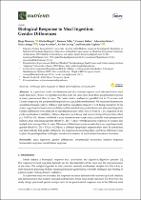Biological Response to Meal Ingestion: Gender Differences
Author
Date
2019-03-26Permanent link
https://hdl.handle.net/11351/4071DOI
10.3390/nu11030702
ISSN
2072-6643
WOS
WOS:000464373100005
PMID
30917512
Abstract
In a previous study, we demonstrated that women enjoyed and tolerated lower meal loads than men. Hence, we hypothesized that with the same meal load, their postprandial response is more pronounced than in men. We performed a randomized parallel trial in 12 women and 12 men comparing the postprandial responses to a palatable comfort meal. We measured homeostatic sensations (hunger/satiety, fullness) and hedonic sensations (digestive well-being, mood) on 10 cm scales, vagal tone by heart ratio variability and the metabolomic profile before and after meal ingestion. Gender differences were analyzed by repeated measures ANCOVA. Overall (n = 24), ingestion of the probe meal induced satiation, fullness, digestive well-being and improved mood (main time-effect p ≤ 0.005 for all). Women exhibited a more intense sensory experience, specially more postprandial fullness, than men [main gender-effect F (1, 21) = 7.14; p = 0.014]; hedonic responses in women also tended to be stronger than in men. Women exhibited more pronounced effects on vagal tone [main gender-effect F (1, 21) = 5.5; p = 0.029] and a different lipoprotein response than men. In conclusion, our data indicate that gender influences the responses to meal ingestion, and these differences may explain the predisposition and higher incidence in women of meal-related functional disorders.
Keywords
Gender differences; Meal ingestion; Metabolomic responseBibliographic citation
Monrroy H, Borghi G, Pribic T, Galan C, Nieto A, Amigo N, et al. Biological Response to Meal Ingestion: Gender Differences. Nutrients. 2019;11(3):702.
Audience
Professionals
This item appears in following collections
- HVH - Articles científics [4476]
The following license files are associated with this item:

 Private area
Private area Contact Us
Contact Us








